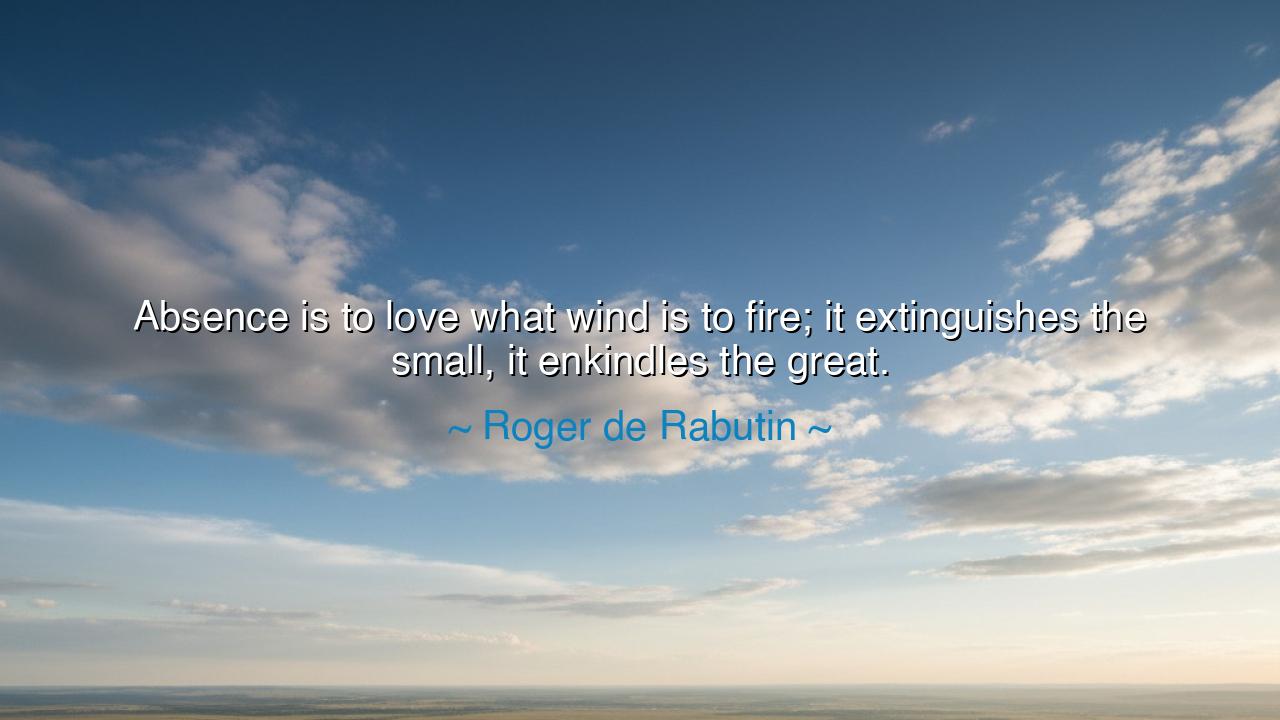
Absence is to love what wind is to fire; it extinguishes the
Absence is to love what wind is to fire; it extinguishes the small, it enkindles the great.






The ancient wisdom of Roger de Rabutin, also known as the Comte de Bussy-Rabutin, whispers to us across the centuries: “Absence is to love what wind is to fire; it extinguishes the small, it enkindles the great.” In these few words lies a truth as old as the dawn — a truth that speaks not only of love between people, but of all forms of devotion, loyalty, and passion that tie the human heart to something greater than itself. The wind does not choose its purpose; it merely passes, and in its passing, it reveals the strength of the flame. So too does absence test the soul — not by cruelty, but by revelation.
When love is small, when it burns only upon the surface of desire or convenience, a moment of absence is enough to snuff it out. The heart forgets, the embers cool, and what was once called affection proves to have been nothing more than a flicker. Yet when love is great, when it burns deep in the marrow of one’s being, then absence becomes the wind that feeds it — spreading it, fanning it, forcing it to reach upward toward heaven. This is the trial of all lasting bonds: to endure the spaces between, to remain faithful even when the warmth is far away.
In the time of the Roman Empire, there lived a soldier named Marcus Flavius, who was sent to the outer provinces for ten long years, far from his wife and the vineyards of his home. Many thought his love would perish in distance, as others’ had before him. But when he returned, his eyes burned brighter than when he left. He had carried her memory as a sacred fire, protected against every storm, every temptation. He said, “It was not her touch that kept me faithful — it was the space between us that taught me what she meant.” Such is the proof of great love: it does not wither in absence; it grows, purified by longing.
The wind, my children, is neither kind nor cruel. It is simply the element that tests what is real. So it is with absence. When it comes — whether through distance, silence, or the trials of life — it separates the hollow from the true. The small fires die, revealing their weakness. The great fires roar higher, made fierce by the very challenge of surviving. The one who endures absence learns the shape of their own heart. The one who cannot bear it learns that their fire was never strong enough to last.
Consider also the tale of Penelope and Odysseus, whose love endured the twenty years of the Trojan War and the long voyage home. The seas, the storms, and the years were their wind; and yet, rather than extinguish their bond, those winds carried it to divine height. Penelope wove her faith by day and unraveled it by night, a ritual to keep her love alive. Her patience, her belief — these were the coals that refused to die. When Odysseus at last returned, it was as if no time had passed, for their fire had been kept eternal.
This is not only the tale of romantic love. It is the same for all great callings — for friendship, for art, for purpose. When you are separated from what you love, when fate places distance between you and your dream, that is when the test begins. If the fire dies, you were never meant to keep it. But if it grows brighter in the dark, if it refuses to fade, then you know that what you hold is true and worthy of your devotion. The absence has done its holy work — it has purified your flame.
So remember this teaching: do not fear absence, nor curse the wind. Let it come, and let it teach. If you lose something through distance, it was never yours to keep. If it grows stronger, cherish it all the more. The fire that survives the wind is the one that can light the world.
Action for the living: When life pulls you apart from what you love — a person, a dream, a purpose — do not despair. Instead, tend to your inner fire. Write to those who are far away. Speak their names with gratitude. Keep faith with your calling even in silence. For it is in the spaces of absence that love, passion, and purpose prove their worth — and the flame that endures the wind becomes eternal.






AAdministratorAdministrator
Welcome, honored guests. Please leave a comment, we will respond soon